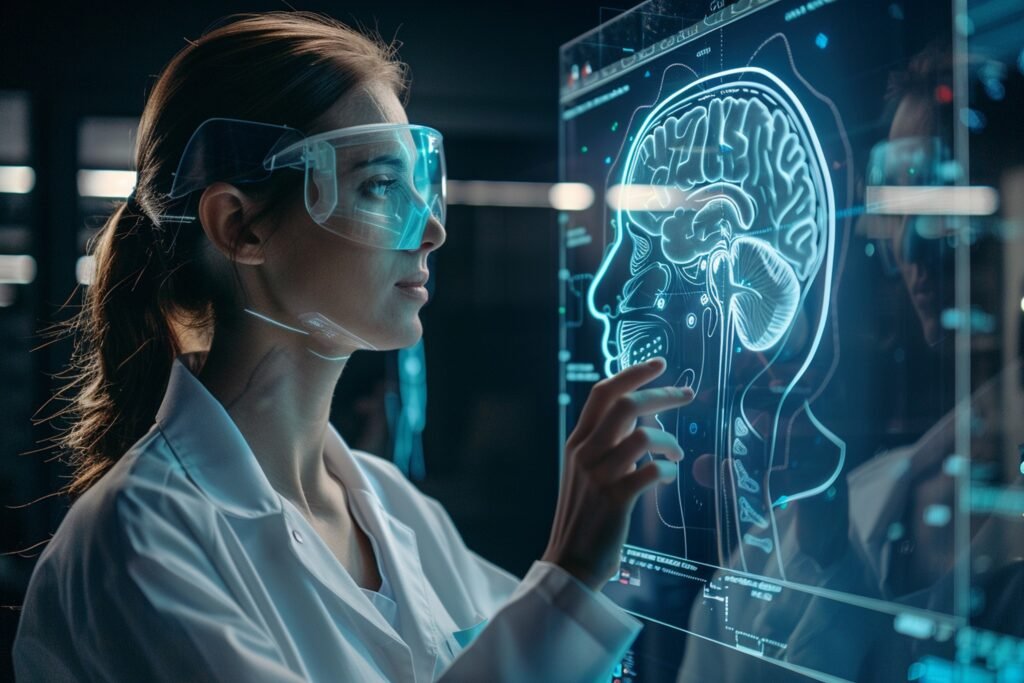In recent years, artificial intelligence (AI) has emerged as a game-changer in various industries, and healthcare is no exception. With its potential to revolutionize patient care, streamline operations, and enhance research, AI is at the forefront of a technological transformation in healthcare. This blog post will explore the key ways AI is reshaping the healthcare landscape and its profound impact on patients and providers.

1. Early Diagnosis and Disease Detection
One of AI’s most significant contributions to healthcare is its ability to diagnose diseases at an early stage. AI algorithms can identify patterns that human doctors might miss by analyzing vast amounts of medical data, including imaging, lab results, and patient histories. For instance, AI-powered tools can detect early signs of cancer, such as breast or lung cancer, with remarkable accuracy, enabling timely intervention and improving survival rates.
2. Personalized Treatment Plans
AI enables the creation of personalized treatment plans tailored to individual patients. By considering a patient’s genetic makeup, lifestyle, and medical history, AI can recommend the most effective treatments and predict how patients will respond to specific therapies. This personalized approach enhances treatment outcomes and minimizes adverse effects, leading to better patient experiences.
3. Predictive Analytics for Patient Management
Predictive analytics powered by AI is revolutionizing patient management. Hospitals can now predict patient admission rates, optimize bed occupancy, and allocate resources more efficiently. AI can analyze patient data for chronic disease management to predict flare-ups or complications, allowing for proactive interventions and reducing hospital readmissions.
4. Enhanced Medical Imaging
AI is transforming medical imaging by improving the accuracy and efficiency of image analysis. Radiologists can leverage AI algorithms to detect abnormalities in X-rays, MRIs, and CT scans more precisely. This speeds up the diagnostic process and reduces the likelihood of human error. In some cases, AI systems have demonstrated the ability to identify previously undetectable conditions.
5. Virtual Health Assistants
Virtual health assistants powered by AI are becoming increasingly common. These assistants can provide patients with round-the-clock support, answer health-related queries, schedule appointments, and even offer medical advice based on symptoms. This level of accessibility and convenience enhances patient engagement and helps reduce the burden on healthcare providers.
6. Drug Discovery and Development
AI is accelerating drug discovery and development, which has traditionally been time-consuming and costly. AI can identify potential drug candidates and optimize clinical trial designs by analyzing biological data and predicting molecular interactions. This reduces the time required to bring new drugs to market, ultimately benefiting patients who need innovative treatments.
7. Improving Clinical Decision-Making
AI is a powerful tool for enhancing clinical decision-making. By integrating data from electronic health records (EHRs), medical literature, and clinical guidelines, AI systems can provide evidence-based recommendations to healthcare providers. This support helps clinicians make informed decisions, leading to better patient outcomes and more efficient care delivery.
8. Administrative Efficiency
Beyond direct patient care, AI is streamlining administrative tasks in healthcare. From automating billing and coding to managing patient records and scheduling, AI reduces administrative burdens and frees up valuable time for healthcare professionals to focus on patient care. This efficiency can lead to cost savings and improved overall productivity in healthcare organizations.
9. Telemedicine and Remote Monitoring
AI plays a crucial role in the growth of telemedicine and remote patient monitoring. AI-powered platforms can analyze data from wearable devices and remote monitoring tools to track patients’ health in real-time. This allows for continuous monitoring of chronic conditions, early detection of health issues, and timely interventions, all from the comfort of a patient’s home.
Conclusion
Integrating AI in healthcare is a technological advancement and a paradigm shift that promises to improve patient outcomes, enhance operational efficiency, and drive innovation. As AI continues to evolve, its potential to transform healthcare will only grow, paving the way for a future where medical care is more personalized, accurate, and accessible. Embracing AI in healthcare is not just an option; it is necessary to build a healthier and more sustainable world.